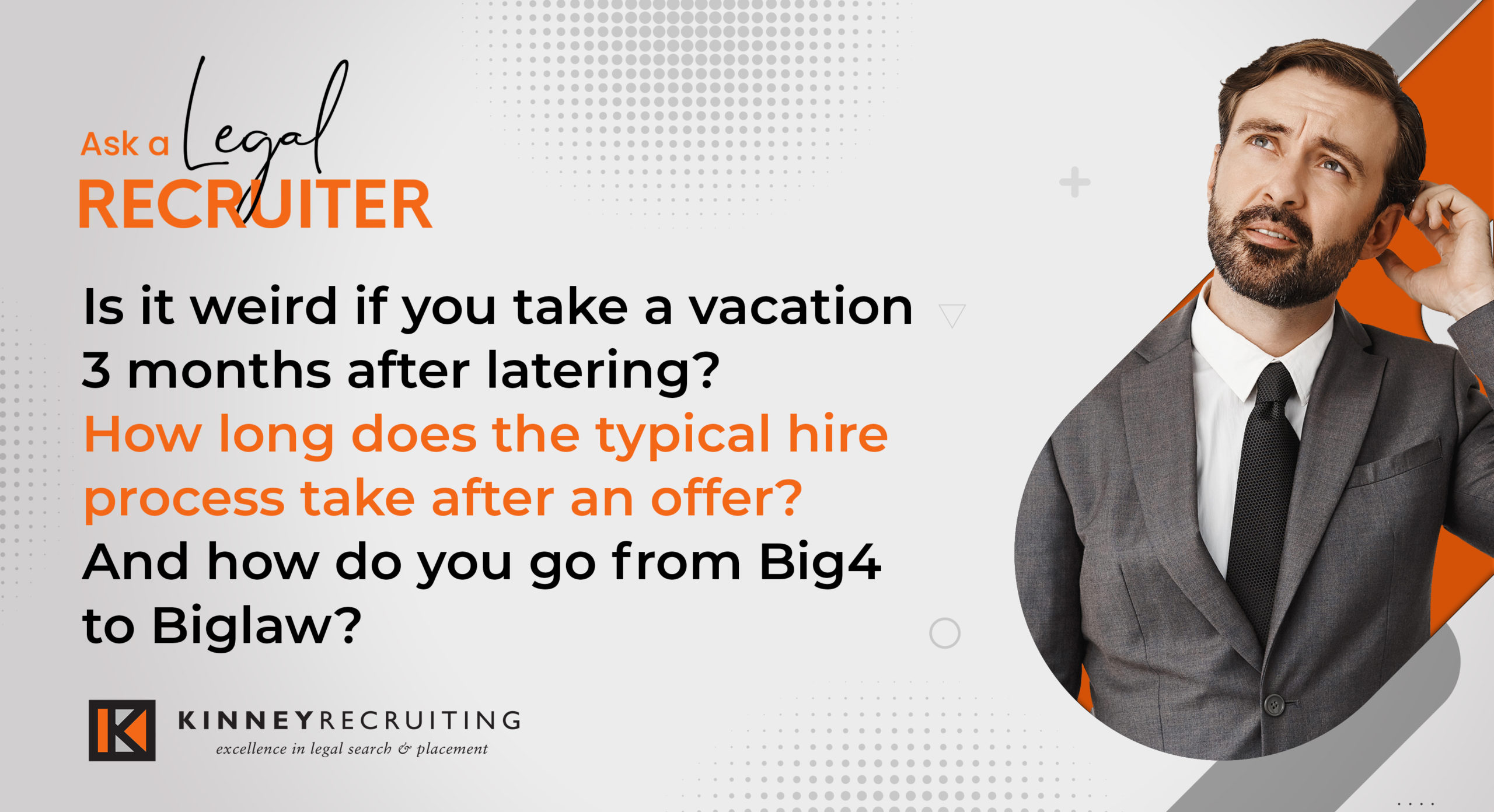
For almost two decades, Kinney Recruiting has been a top international legal recruitment agency and home to some of the most distinguished legal recruiters in the world. With vast market experience and our trademark “no BS” approach, Kinney’s recruiters are favorites among candidates and clients in the legal industry. We are keen to share some of what we have learned with more people, so we have launched Ask a Legal Recruiter, an opportunity for our recruiters to answer your questions. Do you want to know more about how legal recruiting works or what lateraling looks like? How about our take on the market? If you have a question, email and we will get back to you with our take!
Question: “Would it be weird to take a vacation 3 months after lateraling?”
Daniel Roark: This is a very common situation for lateraling candidates and one where an experienced recruiter will assist their candidates by either backchanneling with a firm’s recruiting department/hiring attorney(s) and/or coaching a candidate on the proper timing and manner for discussing such scheduled items post-start date. Should a candidate discuss their booked trip to Tulum in a first interview? Definitely not. But as the contours of an offer for employment and related timing considerations take shape, discussions of a candidate’s schedule should occur. For example, I just represented a candidate for an in-house position who had a long-planned trip to France scheduled for one month after the client’s suggested start date. During the offer stage, I was able to discuss my candidate’s planned vacation with the client, and we reached an efficient solution where the candidate would start as soon as possible (after providing notice) in order to get moved, situated, and trained prior to departing for his vacation. Issues regarding schedules (planned holidays, weddings, medical issues, life events) are commonplace and generally resolved favorably when dealing with reasonable parties who are willing to compromise on some level.
Question: “How long does the typical hire process take after the offer? Including background check, conflicts, etc.”
Joshua Shirley: Typically, after a Biglaw offer is made and it is accepted, the process takes about 3 weeks for background checks and conflicts to clear. In some cases, it can be longer for laterals who need to have background checks cleared in other countries. Some firms can complete conflicts in under two weeks. Conflicts can also take longer, think 4-7 weeks, during extremely busy periods of lateral movement in the market. These processes typically go quicker and smoother when you’re working with someone who is experienced in guiding attorneys through them. With Kinney’s collective experience we’ve seen it all and know what works best and what doesn’t.
Question: “How do I go from big4 to a law firm?”
Jack Hopper: The answer largely depends on what kind of work a candidate wants to do with a law firm. If they want to stay strictly in tax, the transition can be more fluid, although still not easy. If the desire is to join an M&A practice for instance, then gaining tax experience in the M&A context is obviously helpful. It is also important to have realistic expectations. Going from Big4 to BigLaw is very difficult without prior law firm experience, and of course you must have an impeccable academic pedigree as well. Targeting smaller regional firms and boutiques can offer more opportunities, particularly for those candidates with strong academics. This way you can start gaining law firm experience and can move up to BigLaw once you have gained said experience.
Daniel Roark: My esteemed colleague, Jack, has correctly framed some of the challenges in transitioning from Big4 to Biglaw. For candidates who hold Tax LLMs and have accrued some transactional tax experience, this lateral option is the most available. For all, much will depend on the state of the hiring market at the time. In 2020 and 2021 when AmLaw 100 firms were luring corporate associates with up-to-six figure signing bonuses, we were successful in placing candidates with more non-traditional background (i.e., candidates not practicing BigLaw) in regional or major firm roles. Often these candidates were more junior in their careers and required to take steps back in class year to accommodate such a lateral move. For more senior candidates, the way into a law firm is through provable and portable client relationships. Business Development is critical and if you can help a law firm grow its revenue, your candidacy is viewed with favor.
Have a question of your own? Email and we will get back to you with our take!

